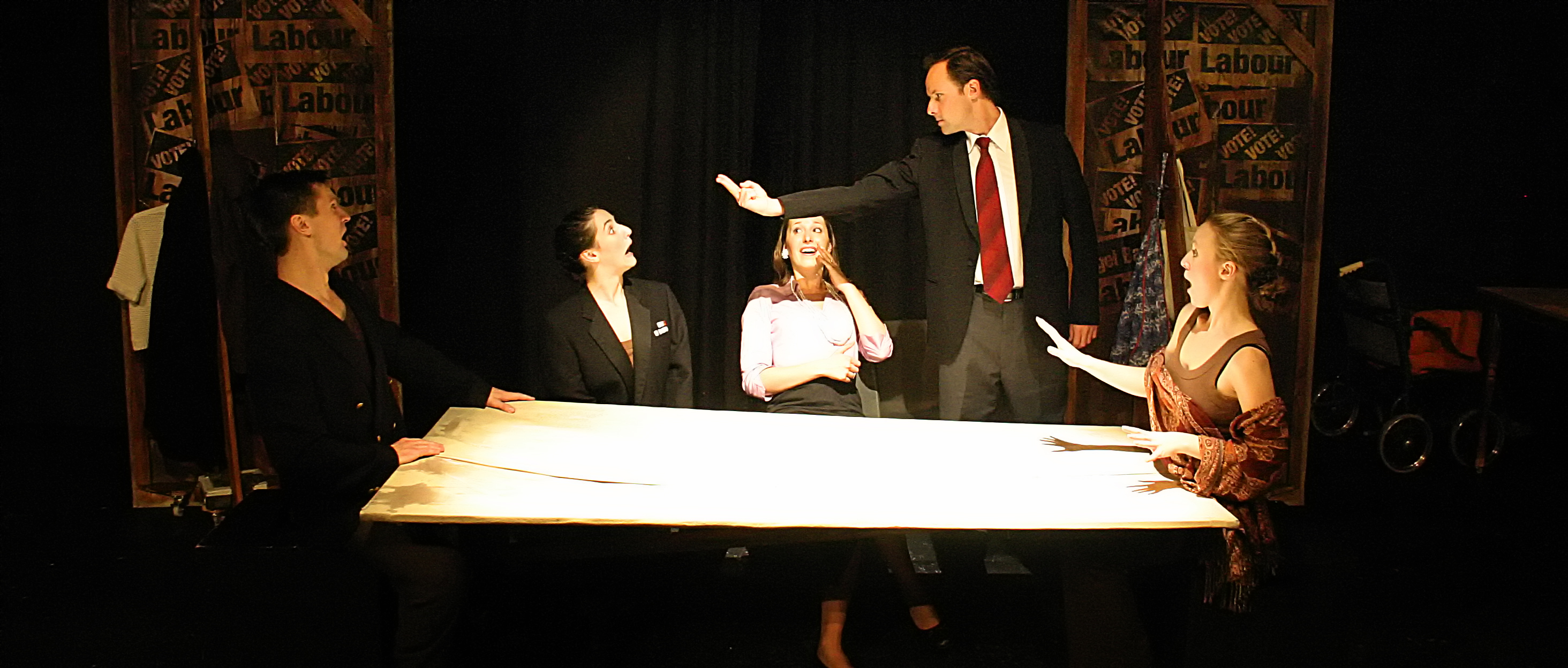
Like Orson Welles, Dennis Potter (1935-94) all but started at the top, acclaimed as one of television’s greatest writers from his first year in the business. A BBC initiative, aimed at developing new writers, saw four of his plays transmitted in 1965. These included the two Nigel Barton plays: Stand Up Nigel Barton, and VOTE VOTE VOTE For Nigel Barton.
The screenplay for VOTE VOTE VOTE was heavily influenced by Potter’s own experience as a Labour party candidate in the 1964 election. Standing in the safe Tory heartland of rural Hertfordshire, Potter didn’t stand a chance of winning. Yet his total revulsion at the experience seems to have been caused by something much deeper than the simple prospect of political defeat. “To be a candidate is to submit to a personally humiliating experience, in which the set smile freezes on your face like a grin on a corpse”, Nigel comments at one point in the show. In the event Potter was so disgusted by the electoral charade that he refused to even cast a vote for himself.
In the age of Blair and Campbell, the relationship between Nigel Barton and his cynical electoral agent Jack Hay seems all too familiar, while the apathy which greeted politics 40 years ago – the paralysing feeling that for all the establishment’s faults there simply was no other way – could be the subject of a contemporary Panorama. Yet less than five years after the piece was first screened, The Human Be-In and Woodstock Festivals would have kick-started the Summer of Love, the Paris revolution of 1968 would have shaken the political establishment to its core – removing the reactionary French Premier Pompideau and eventually leading to the fall of the Nationalist and Conservative Presidency of DeGaulle – Czechoslovakia would be celebrating the political, cultural and artistic renaissance of the Prague Spring, while the Anti-Vietnam movement would be marching across every major city and campus in the world.
There is no clear moral to VOTE VOTE VOTE, by the last scene Nigel appears to have given up on electoral politics, much as Potter himself did. In his recent after-dinner gaff, John Humphrys was quoted out of context as having accused all politicians of dishonesty. In fact, he made a far more interesting point: that the nature of the political game is such that dishonesty is sometimes called for. Be it in their assessment of the current economic situation or their attempts to influence the national mood, it is sometimes necessary for politicians to lie, and a politician who doesn’t would be negligent. This is a position which I suspect would find favor with Jack Hay, yet for most of us this doesn’t seem a particularly desirable state of affairs. Could we ever trust a person who has spent their entire career bending the truth for what they believe? It is surely a very slippery psychological slope – you might even end up believing in WMD.
Yet, as Barton realizes, this is not the fault of individuals. In his final tirade it is not individual politicians he criticizes, but the structural demands of politics itself. It is the process of standing as a candidate which is corrupting, irrespective of the individual. There is none of the salvation we expect from the narrative of commercial cinema. No honest man makes good in the face of a corrupt world. When faced with the realities of the political machine, the honest man realizes that he must necessarily be corrupted if he is to take part. When so much of our culture is based on the modernist ideal of the heroic male individual standing up to a hostile world and changing it in his own image, this alternative narrative is an uncomfortable one.
It is much easier is to attach our criticisms to an individual rather than blame the system itself for the failings of our politicians. To suggest that the way the system is structured is the main influence on human agency does not do a great deal for our belief in free will. Yet when individuals from every shade of politics, every conceivable background and across every era in history display the same characteristics when put in the same systems, perhaps it is time we started questioning the institutions and not blaming the individuals. Yet 40 years on we are once again confronted with the paralyzing feeling that this is the only way. Perhaps it is.
– Alexander Parsonage




